Dacia Spring vs Genesis GV80 – Which car suits you better?
Both models have their strengths – but which one suits you more?
Compare performance, efficiency, price and space directly: Dacia Spring or Genesis GV80?
Costs and Efficiency:
When it comes to price and running costs, the biggest differences usually appear. This is often where you see which car fits your budget better in the long run.
Dacia Spring has a significantly advantage in terms of price – it starts at 14500 £, while the Genesis GV80 costs 59400 £. That’s a price difference of around 44897 £.
Engine and Performance:
Under the bonnet, it becomes clear which model is tuned for sportiness and which one takes the lead when you hit the accelerator.
When it comes to engine power, the Genesis GV80 has a clearly edge – offering 304 HP compared to 65 HP. That’s roughly 239 HP more horsepower.
In acceleration from 0 to 100 km/h, the Genesis GV80 is significantly quicker – completing the sprint in 6.90 s, while the Dacia Spring takes 13.70 s. That’s about 6.80 s faster.
In terms of top speed, the Genesis GV80 performs clearly better – reaching 237 km/h, while the Dacia Spring tops out at 125 km/h. The difference is around 112 km/h.
There’s also a difference in torque: Genesis GV80 pulls significantly stronger with 588 Nm compared to 125 Nm. That’s about 463 Nm difference.
Space and Everyday Use:
Cabin size, boot volume and payload all play a role in everyday practicality. Here, comfort and flexibility make the difference.
Seats: Genesis GV80 offers clearly more seating capacity – 7 vs 4.
In curb weight, Dacia Spring is clearly lighter – 1013 kg compared to 2155 kg. The difference is around 1142 kg.
In terms of boot space, the Genesis GV80 offers convincingly more room – 735 L compared to 308 L. That’s a difference of about 427 L.
In maximum load capacity, the Genesis GV80 performs decisively better – up to 2152 L, which is about 1148 L more than the Dacia Spring.
When it comes to payload, Genesis GV80 convincingly takes the win – 690 kg compared to 302 kg. That’s a difference of about 388 kg.
Who comes out on top?
Overall, the Genesis GV80 shows itself to be outperforms in nearly all aspects and secures the title of DriveDuel Champion.
It convinces with the more balanced overall package and proves to be the more versatile choice for everyday use.
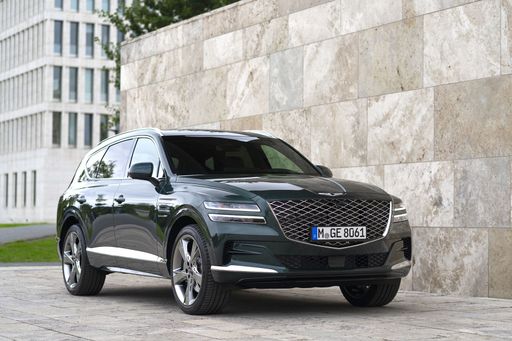 @ Genesis Motor / Hyundai Motor Group
@ Genesis Motor / Hyundai Motor Group
Genesis GV80
Dacia Spring
The Dacia Spring is an unpretentious city electric that strips EV ownership down to the essentials, offering clean, fuss-free transport for daily urban life. It won't impress luxury-seekers, but its cheerful practicality and rock-bottom running costs make it a clever, no-nonsense choice for anyone who wants electric mobility without the drama.
details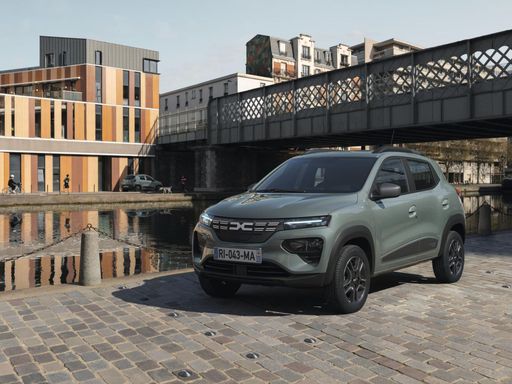 @ Dacia / Renault Group Media
@ Dacia / Renault Group Media
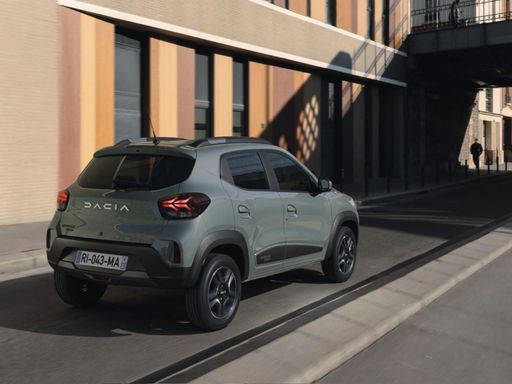 @ Dacia / Renault Group Media
@ Dacia / Renault Group Media
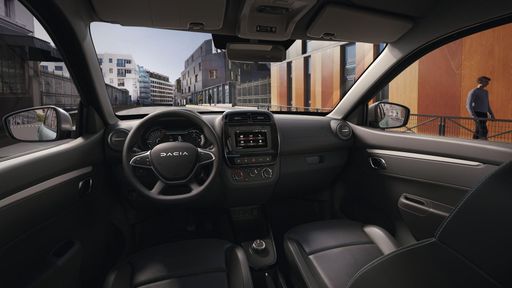 @ Dacia / Renault Group Media
@ Dacia / Renault Group Media
Genesis GV80
The Genesis GV80 impresses with its refined design and luxurious interior, offering an opulent driving experience that stands out in the luxury SUV segment. It delivers exceptional comfort and advanced technology features that enhance both driver and passenger enjoyment. The GV80 combines style and performance seamlessly, making it a compelling choice for those seeking sophistication on the road.
details @ Genesis Motor / Hyundai Motor Group
@ Genesis Motor / Hyundai Motor Group
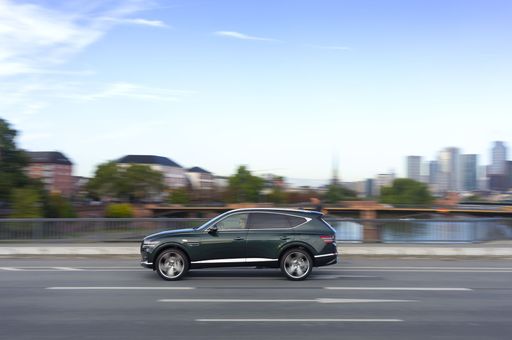 @ Genesis Motor / Hyundai Motor Group
@ Genesis Motor / Hyundai Motor Group
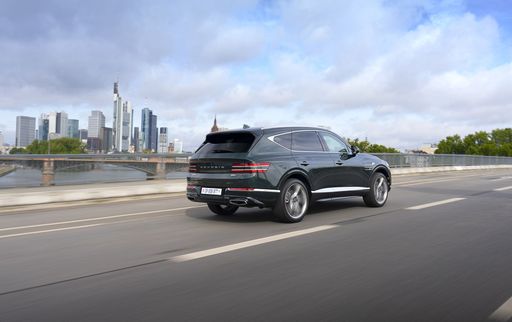 @ Genesis Motor / Hyundai Motor Group
@ Genesis Motor / Hyundai Motor Group
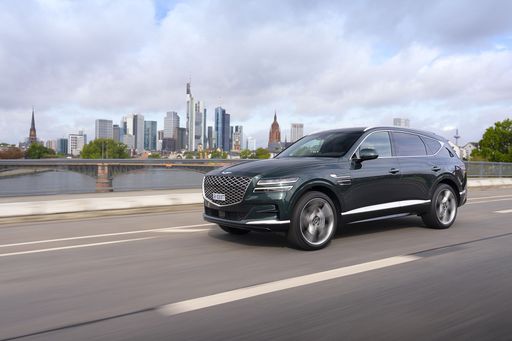 @ Genesis Motor / Hyundai Motor Group
@ Genesis Motor / Hyundai Motor Group
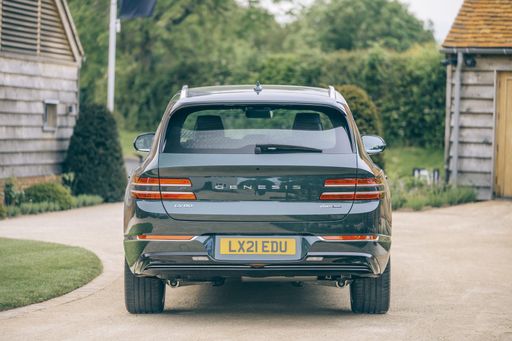 @ Genesis Motor / Hyundai Motor Group
@ Genesis Motor / Hyundai Motor Group
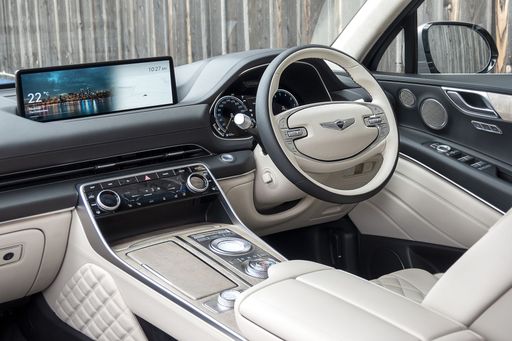 @ Genesis Motor / Hyundai Motor Group
@ Genesis Motor / Hyundai Motor Group
 @ Dacia / Renault Group Media
@ Dacia / Renault Group Media
|
 @ Genesis Motor / Hyundai Motor Group
@ Genesis Motor / Hyundai Motor Group
|
|
|
|
Costs and Consumption |
|
|---|---|
|
Price
14500 - 17100 £
|
Price
59400 - 75600 £
|
|
Consumption L/100km
-
|
Consumption L/100km
8.8 - 10.8 L
|
|
Consumption kWh/100km
13.2 - 14.1 kWh
|
Consumption kWh/100km
-
|
|
Electric Range
225 - 228 km
|
Electric Range
-
|
|
Battery Capacity
26.80 kWh
|
Battery Capacity
-
|
|
co2
0 g/km
|
co2
231 - 241 g/km
|
|
Fuel tank capacity
-
|
Fuel tank capacity
80 L
|
Dimensions and Body |
|
|---|---|
|
Body Type
SUV
|
Body Type
SUV
|
|
Seats
4
|
Seats
5 - 7
|
|
Doors
5
|
Doors
5
|
|
Curb weight
1013 - 1050 kg
|
Curb weight
2155 - 2325 kg
|
|
Trunk capacity
308 L
|
Trunk capacity
727 - 735 L
|
|
Length
3701 mm
|
Length
4945 mm
|
|
Width
1583 mm
|
Width
1975 mm
|
|
Height
1519 mm
|
Height
1715 mm
|
|
Max trunk capacity
1004 L
|
Max trunk capacity
2144 - 2152 L
|
|
Payload
265 - 302 kg
|
Payload
660 - 690 kg
|
Engine and Performance |
|
|---|---|
|
Engine Type
Electric
|
Engine Type
Petrol, Diesel
|
|
Transmission
Automatic
|
Transmission
Automatic
|
|
Transmission Detail
Reduction Gearbox
|
Transmission Detail
Automatic Gearbox
|
|
Drive Type
Front-Wheel Drive
|
Drive Type
All-Wheel Drive
|
|
Power HP
44 - 65 HP
|
Power HP
272 - 304 HP
|
|
Acceleration 0-100km/h
13.7 - 19.1 s
|
Acceleration 0-100km/h
6.90 s
|
|
Max Speed
125 km/h
|
Max Speed
230 - 237 km/h
|
|
Torque
113 - 125 Nm
|
Torque
422 - 588 Nm
|
|
Number of Cylinders
-
|
Number of Cylinders
4 - 6
|
|
Power kW
33 - 48 kW
|
Power kW
200 - 224 kW
|
|
Engine capacity
-
|
Engine capacity
2497 - 2996 cm3
|
General |
|
|---|---|
|
Model Year
2024
|
Model Year
2021 - 2022
|
|
CO2 Efficiency Class
A
|
CO2 Efficiency Class
G
|
|
Brand
Dacia
|
Brand
Genesis
|
What drive types are available for the Dacia Spring?
The Dacia Spring is available as Front-Wheel Drive.
The prices and data displayed are estimates based on German list prices and may vary by country. This information is not legally binding.
